Research Reports
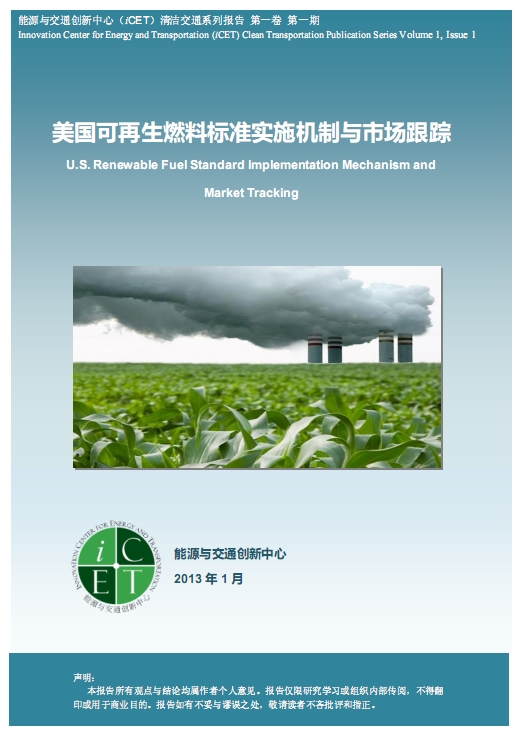
U.S. Renewable Fuel Standard Implementation Mechanism and Market Tracking (Jan 2013 / Clean Transportation Program / CHINESE)
This report briefly introduces the U.S. Renewable Fuel Standard (RFS), a policy for promoting the use of biofuels in order to reduce the country’s dependency on foreign oil and greenhouse gas emissions. The RFS requests fuel refiner, blenders and importer in the US provide a certain amount of renewable fuels every year (Renewable Volume Obligation – RVO). Obligated parties prove they have achieved their RVO through a renewable fuels certification system, which generates Renewable Identification Numbers (RINs) for every unit of qualified renewable fuels produced or released into the market. RINs are a key for tracking renewable fuel consumption, which in turn is a key for implementing the RFS in the US. This documents highlights RFS policy implementing mechanism and marketing tracking, mainly describes importance of RINs, and the method for generating and tracking RINs by both government and fuels industry participants.
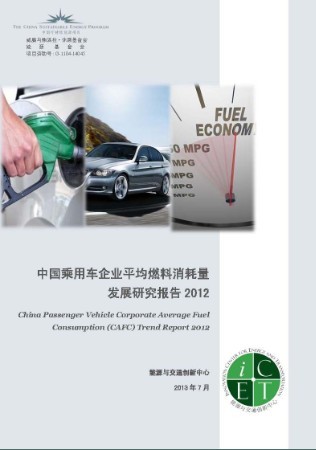
2012 China Passenger Vehicle Corporate Average Fuel Consumption Report (June 2013 / Clean Transportation Program)
In the June 2013,five ministries jointly announced "corporate average fuel consumption of passenger cars accounting approach" Innovation Center for Energy and Transportation based on data and standard methodologies from national authorities, iCET research and analysis of the 2012 Chinese different car brands average fuel consumption ranking, reviewed the "Eleventh Five-Year Plan", and forecast the trend of "Twelfth Five-Year Plan" development. Assumptions based on experience and the introduction of a quota value of this concept. Hopes to publish charts, cause-related automobile enterprises to pay attention to environmental protection, the development of energy-saving cars and truly reflects the current situation and policy recommendations.
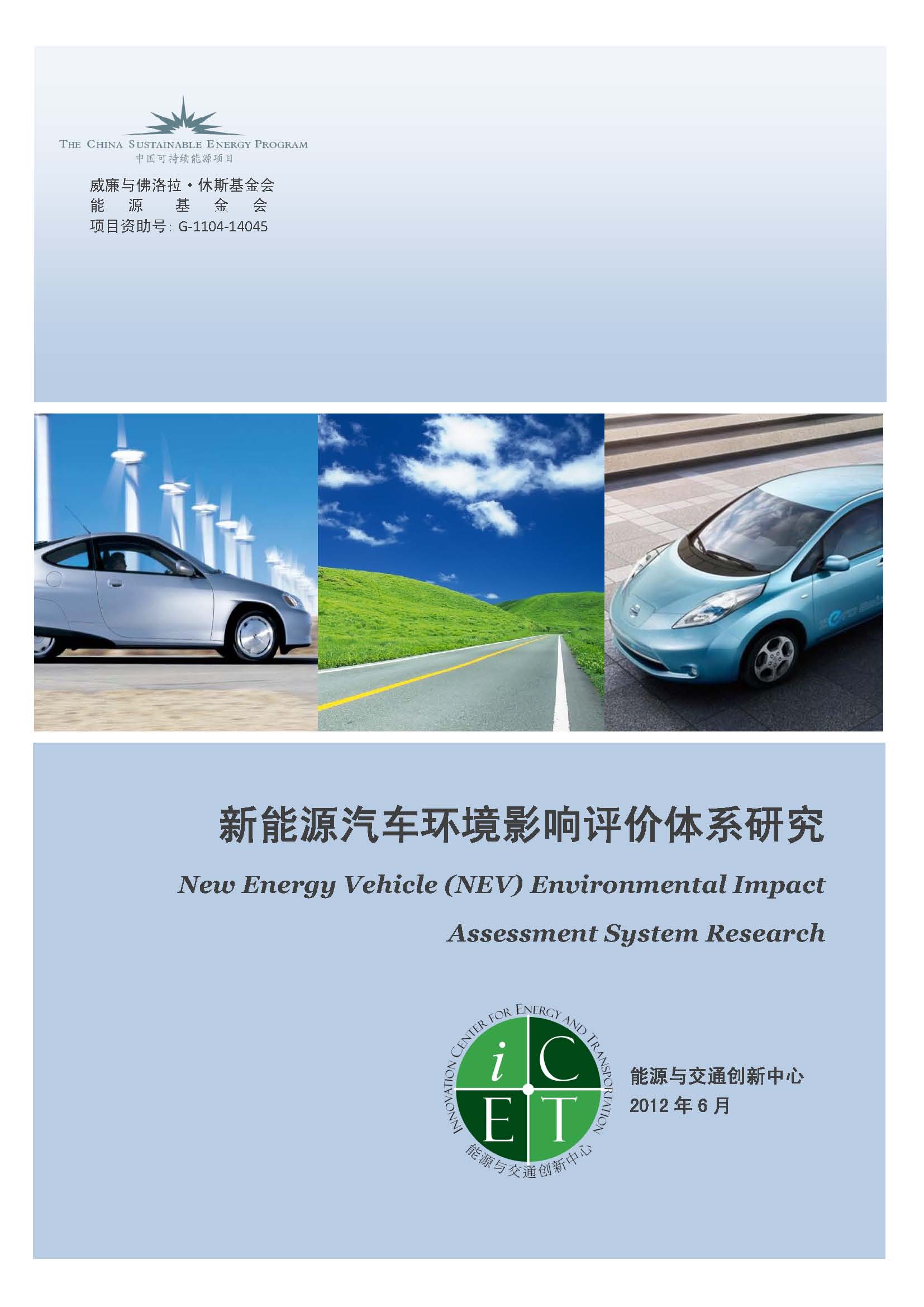
New Energy Vehicles: Environmental Impact Evaluation System Research (June 2012 / Clean Transportation Program / CHINESE)
New Energy Vehicles have the potential to produce significant environmental benefits when compared to conventional internal combustion vehicles. However, due to China’s relatively dirty sources of electrical power production, when examining NEVs from a lifecycle perspective, they simply aren’t that clean. Furthermore, the batteries used in electric vehicles carry their own environmental impact due to the intensive nature of their industrial production. This report analyses information from both Chinese and global sources, and using iCET’s Environmentally Friendly Vehicle rating system methodology as a basis, incorporates the lifecycle environmental impact of electric vehicles. Using the Nissan Leaf and Toyota Prius as examples, the full lifecycle environmental impacts of a pure electric vehicle and a plug-in hybrid vehicle are evaluated. In the context of the fast development of NEVs in China, taking a lifecycle assessment approach to the environmental impact of vehicles offers a scientific means of understanding the contribution this industry will make to energy efficiency and emission reduction.
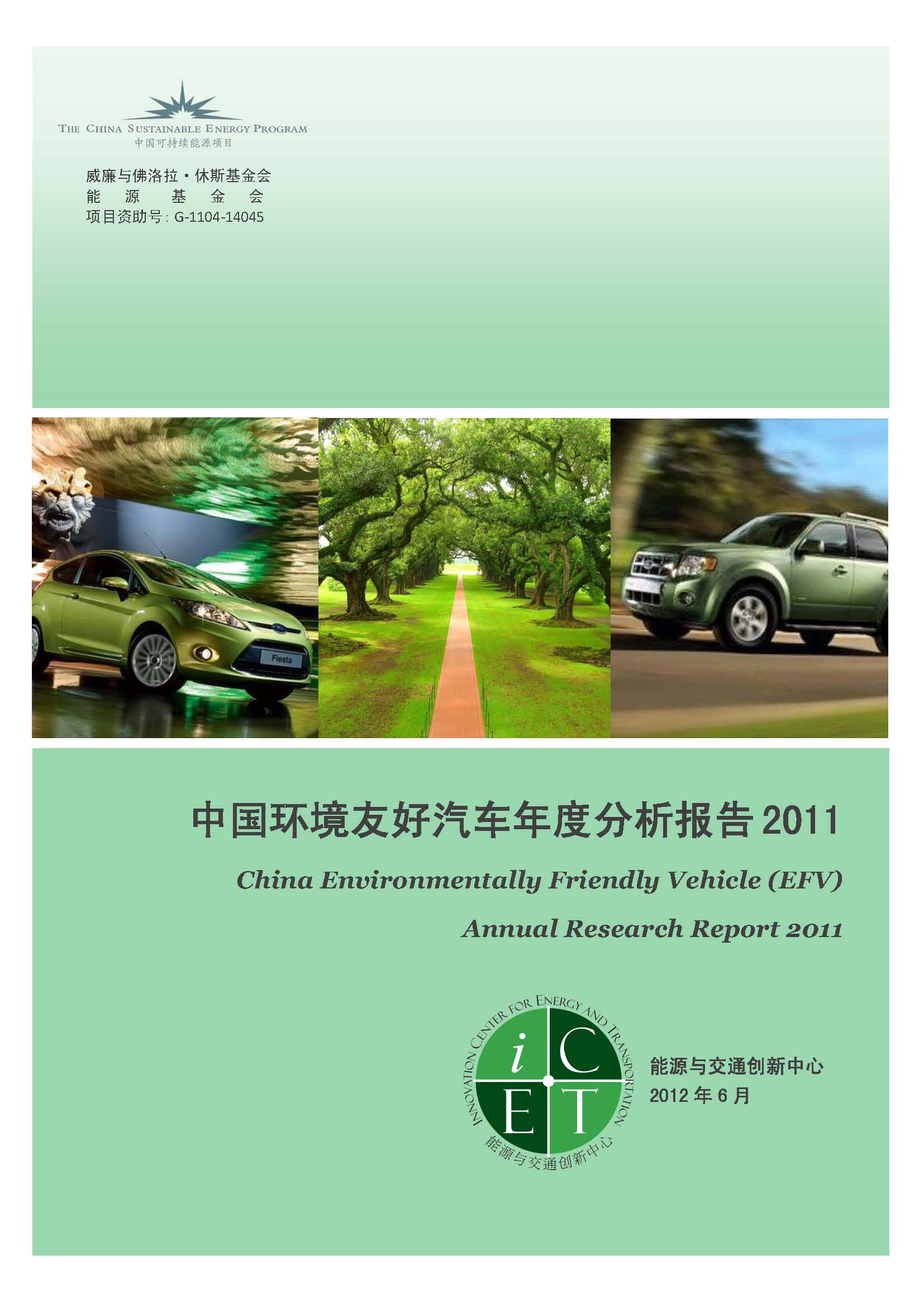
2011 China Environmentally Friendly Vehicle Annual Research Report (June 2012 / Clean Transportation Program)
This report makes use of the iCET Environmentally Friendly Vehicle rating system to report on China’s greenest cars in 11 market segments in 2011, including micro, small, compact, mid-size, large mid-size, luxury, SUV, MPV, sports, microvan and mild hybrid segments. The evaluation is based on the climate change and health impacts of the vehicle in three stages: manufacturing phase, fuel production phase and operation phase.
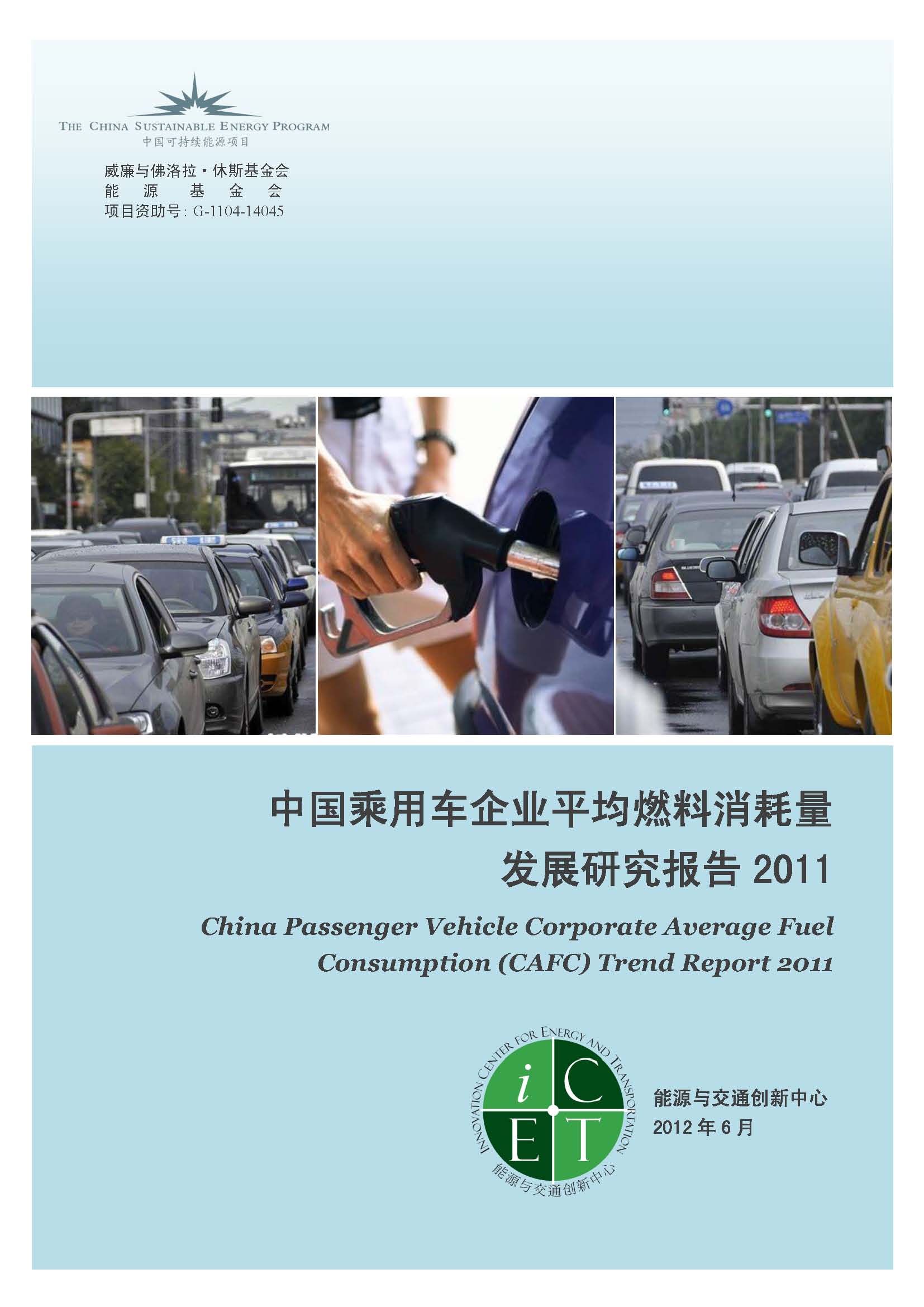
2011 China Passenger Vehicle Corporate Average Fuel Consumption Report (June 2012 / Clean Transportation Program)
On 1 January 2012, China's “Passenger Vehicle Fuel Consumption Limits” Phase III, jointly drafted by the China Automotive Technology and Research Center (CATARC) and major automotive producers, and approved by the Ministry of Industry and Information Technology (MIIT) came into effect. This report makes use of government-sourced data and a standardized methodology to calculate the corporate average fuel consumption of different automotive groups and brands in China, and makes an analysis of fuel economy in the 11th Five-Year Development Plan, as well as trends in the implementation of the 12th Five Year Plan. This report and ranking aims to encourage companies to continuously adjust their product structures, develop more efficient vehicles and improve the implementation of their social and environmental responsibilities.
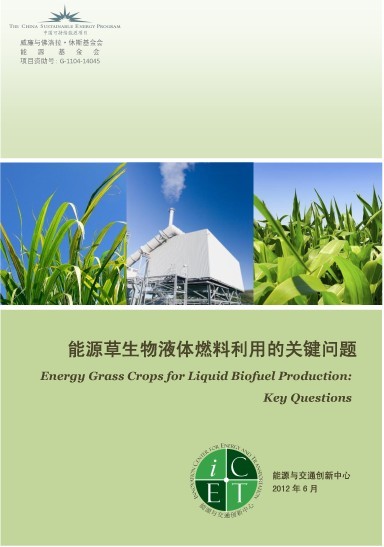
Energy Grass Crops for Liquid Biofuel Production: Key Questions (May 2012 / Clean Transportation Program /CHINESE)
Energy grasses are one source of feedstock for advanced biofuels. The recognition and research on energy grasses as an important contributor for liquid biofuels in China are still in their early stages. This report addresses some of the key questions related to the production and use of energy grasses in the production of transport fuels, including: “What are energy grasses?”, “What is the roadmap for the use of energy grasses for fuels in China?”, “What are the economic costs of converting energy grasses into liquid fuels?”, “What are the advantages and disadvantages of using energy grasses as a fuel feedstock?”, and “What are the existing problems and obstacles for energy grass utilization?”. This report aims to inspire scientific research institutes, government organizations and society at large to take a closer look at this potential source of transportation energy.
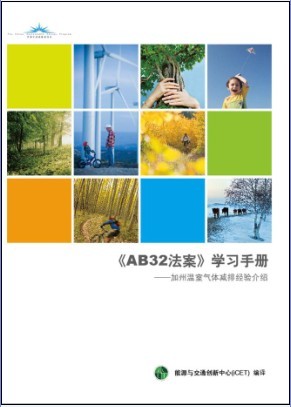
AB 32 Training Manuals (for official training): California Air Resources Board Assembly Bill 32 (AB 32) Climate Change Measures (Recognized by California Air Resources Board) (December 2011 / Carbon Management Program / CHINESE)
As a second phase of our AB 32 project, iCET created several in-depth training manuals in Chinese on specific AB 32 greenhouse gas reduction measures –Low Carbon Fuel Standards, Energy Efficiency, Cap and Trade program linked to Western Climate Initiative, Light Duty Vehicle GHG Standards (forthcoming), and Renewables Portfolio Standard (forthcoming). Each of our individual Chinese training manuals contains substantive policy analysis conducted by iCET staff on the feasibility of AB32 measures in China and how AB32 practices can be implemented in the Chinese context. The training manuals are currently being used in workshops in China. as AB32 continues to be rolled out in CA, we plan to continue to conduct in-depth training on other AB32 measures and to take further steps in transferring California experience and best practices in implementing AB 32.
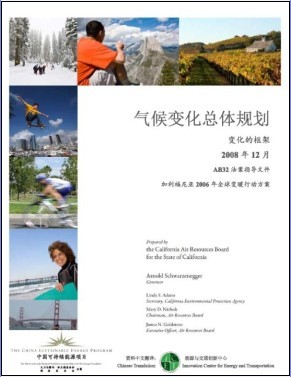
California Air Resources Board Assembly Bill 32 (AB 32) Climate Change Scoping Plan (Recognized by California Air Resources Board) (2011 / Carbon Management Program / CHINESE translation)
iCET has committed itself to continue be a bridge between California and China. This year, iCET has started to introduce California’s ground-breaking Assembly Bill 32 (AB 32) law to China’s government officials. iCET translated the 125+ page Scoping Plan which contains the maximum technologically feasible and cost-effective strategies for California to reduce greenhouse gases. As presented by the California Air Resources Board, the AB 32 Scoping Plan has a multitude of actions which include “direct regulations, alternative compliance mechanisms, monetary and non-monetary incentives, voluntary actions, market-based mechanisms such as a cap-and-trade system, and an AB 32 program implementation regulation to fund the program.” iCET’s translation is currently undergoing further revision as AB 32 is updated and as we receive feedback from readers.
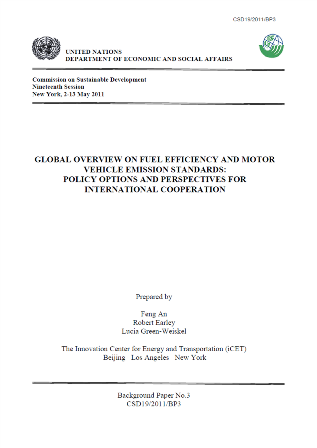
A Global Overview on Fuel Efficiency and Motor Vehicle Emission Standards: Policy Options and Perspectives for International Cooperation (for UNCSD) (March 2011 / Clean Transportation Program)
The report provides updated profiles for the United States (both federal and California approach), the European Union, China, Japan, the Republic of Korea, Canada, India and Latin American developing countries and outlines challenges and potential solutions for methodologies for comparing standards between different countries and regions. It serves as background information for the 19th Session of the United Nations Commission on Sustainable Development in New York, 2-13 May 2011.
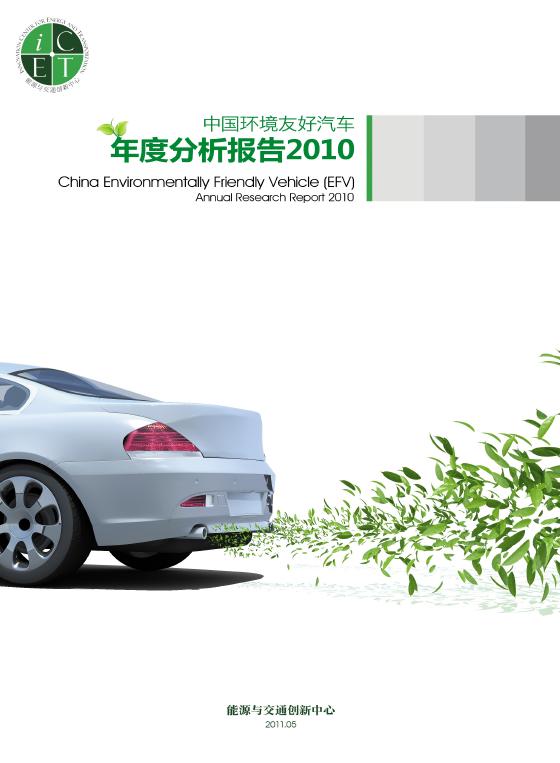
China Environmentally Friendly Vehicle (EFV) Annual Research Report 2010 (May 2011 / Clean Transportation Program)
This report is based on the Environmentally Friendly Vehicle methodology jointly developed by iCET and the Vehicle Emission Control Center of the Ministry of Environmental Protection in 2006-2007 for evaluating the impact of individual models of vehicles on the environment based on openly available data. Taking a lifecycle perspective, the methodology looks at the production and use of vehicles, taking exhaust emission standards, fuel type, fuel economy and curb weight as basic parameters for evaluation. iCET database now contains more than 5400 models of vehicles made under 80 brands in the Chinese market. A Green Rating is available for all vehicles, and the report has also generated top-ten rankings in each of the categories of micro cars, small cars, compact cars, midsize, medium and large cars, luxury cars, SUVs, MPVs, sports cars and New Energy Vehicles.